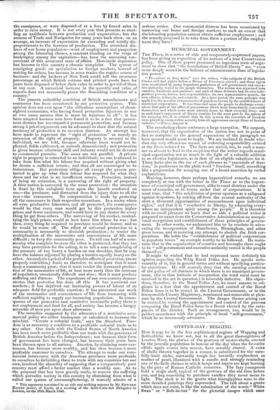MUNICIPAL GOVERNMENT.
THE Times, in a series of able and temperately-expressed papers, has been giving an exposition of its notions of a true Conservative policy. One of those papers presented an ingenious train of argu- ment to show that "the ibundations of British liberty" are "even more deeply seated in the balance of administrative than of legisla- tive power."
" Precarious as they were," says the writer, "the subjects of the British Crown still had rights before a Noose of Commons existed ; and those rights were ascertained by many important gradations of self-government and execu- tive authority vested in the people themselves. The nation was organized into counties, hundreds, and parishes; and each of those divisions had its own inde- pendent powers, duties, and responsibilities, its own representative system, its own officers, tribunals, and councils. At a later period, the same principle was applied to the peculiar circumstances of populous towns, by the establishment of municipal corporations. It was thus cast upon the people to discharge every- where that part of the office of government which most immediately concerned themselves, and which came most directly home to their everyday lives: and as each man's enjoyment of liberty consists for the most part in the sphere of his everyday life, it is evident that by thia system the essentials of freedom were placed in comparative security from all aggressions except those of lawless violence."—Times, August 4.
The concluding clause embraces a large exception. We suspect, moreover, that the organization of the nation was not in point of fact so complete as the general expressions of the paragraph we have quoted would seem to imply. We are inclined to doubt whe- ther any very efficacious means of enforcing responsibility existed at the times referred to. The facts are stated, too, in such a man- ner as almost to lead to the suspicion that the writer regards muni- cipal organization not so much in the light of a valuable addition to an elective legislature, as in that of an eligible substitute for it. There lurks also in the use of such phrases as "essentials of free- dom," in preference to the plain word " freedom " itself, something like a preparation for escaping out of a broad assertion by verbal explanations.
Waiving, however, these perhaps hypercritical remarks, we are completely at one with the writer in the Times as to the import- ance of municipal self-government, alike in rural districts under the name of counties, or in towns under that of corporations. It is most true, that "this subdivision of power operates as a safeguard against despotism, by cutting off from the central authority of the state a thousand opportunities of encroachment upon individual rights," and that it is "conducive to liberty, by educating every- where an independent spirit among the people." It is therefore with no small pleasure we learn that so able a political writer is prepared to exact from the Conservative Administration an unequi- vocal recognition and establishment of these principles of govern- ment. In other words, we understand him to be resolute in advo- cating the incorporation of Manchester, Birmingham, and other great towns, and in resisting any attempt to abolish the Irish cor- porations. He holds the "establishment of political corporations in populous towns" an example worthy to be followed. He main- tains that in the organization of counties and boroughs there ought to he "self-government and executive authority vested in the people themselves."
It might be wished that he bad expressed more definitely his opinion regarding the Whig Rural Police Act. He speaks unfa- vourably of it, but in general terms and without specifying particu- lar objections. He will scarcely deny that the existing condition of the police of all districts in which there is no municipal govern- ment, (for in that latitude of acceptation the word rural must be received in the act in question,) is miserably defective. His objec- tions, therefore, to the Rural Police Act, we must assume to ori- ginate in a fear that the appointment and control of the Rural Police force is to be vested in the Central Government, or in the irresponsible County Magistracy, nominated and removable at plea- sure by the Central Government. The danger thence arising can be averted by vesting the appointment and control of the persons composing the Rural Police force in a Board elected by the rate- payers of the district. Such an arrangement, too, would be in perfect accordance with the principle of local "self-government," which be so strenuously advocates.


























 Previous page
Previous page